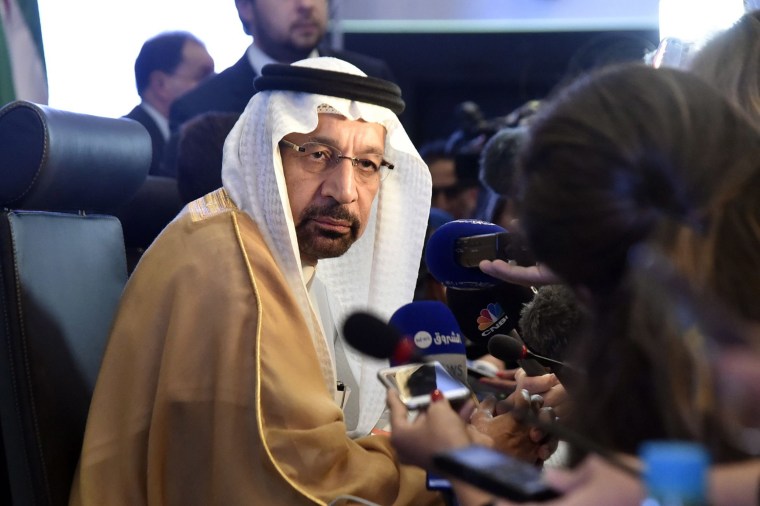Saudi Arabia has “no intention” of stopping oil production or exports as a retaliatory measure against potential sanctions, top energy official Khalid al-Falih told Russian media outlet TASS on Monday.
A number of American lawmakers have called for punitive actions against Saudi Arabia for the death of journalist Jamal Khashoggi.
The Washington Post columnist and Saudi national, who had been living in self-imposed exile in the United States after criticizing the regime, had disappeared after entering the Saudi consulate in Turkey on Oct. 2. After weeks of insisting that it was unaware of Khashoggi’s whereabouts, despite video documentation of the dissident entering — but not leaving — the consulate, Saudi officials confirmed on Friday that Khashoggi had been killed.
The incident is turning into a diplomatic crisis for Saudi Arabian Crown Prince Mohammed bin Salman, the 33-year-old leader who had been heralded as a reformer with a vision to wean the Kingdom off its dependence on petroleum exports.
Although Saudi government officials have denied that the crown prince had a hand in Khashoggi’s killing, it has badly tarnished his reputation and that of his flagship economic conference scheduled to take place this week. Top American business leaders including the CEOs of JP Morgan Chase and Uber have dropped out, along with Secretary of the Treasury Steven Mnuchin and International Monetary Fund Managing Director Christine Lagarde, among others.
President Donald Trump promised “very severe” punitive measures if evidence of bin Salman’s involvement emerges, prompting a statement from Saudi Arabia’s Foreign Ministry threatening a “stronger measure” of retaliation. Given the Kingdom’s oil-dominated export sector and its role as de facto leader of the Organization of the Petroleum Exporting Countries, some market-watchers had expressed concern that its formidable contribution to the global supply could be weaponized.
“I don't find it surprising that Saudi Arabia is coming out swinging on the issue — they've been backed into a corner,” said Patrick DeHaan, head of petroleum analysis at GasBuddy.
In his TASS interview, al-Falih appeared to put that concern to rest. “Rational people in the world know that oil is a very important commodity for the rest of the world. If oil prices will go too high, it will slow down the world economy and would trigger a global recession,” he said.
"I do not believe Saudi Arabia is foolish enough to embargo oil, since it could lead to...a murky path forward in which they would be even more reliant on crude exports to keep their economy afloat."
A dramatic jump in prices would have a rapid effect on worldwide economic growth, according to Oxford Economics, which calculated that $100 oil could shave roughly one-third of a percentage point off global GDP growth in 2019 and 2020, and could contribute an additional 0.7 percent to global inflation.
In an analysis of GDP impact on 26 countries, Oxford found that only three — Russia, Saudi Arabia, and the United Arab Emirates — would see a significant economic benefit if Brent crude oil prices were $100 a barrel.
“I do not believe Saudi Arabia is foolish enough to embargo oil, since it could lead to a global meltdown, higher oil prices, and eventually, as they become more isolated from other countries, a murky path forward in which they would be even more reliant on crude exports to keep their economy afloat,” DeHaan said.
At the same time, the upcoming deadline on Iran sanctions that will effectively remove its output from the market could inject volatility into oil prices, potentially giving Saudi Arabia diplomatic leverage. “It is very important for the world to support Saudi Arabia, because it is the only country that invests heavily in spare capacities,” al-Falih said. “Saudi Arabia needs to be appreciated and supported, recognized for doing very honorable duty for the rest of the global community.”
DeHaan maintained, though, that trying to use its oil on the diplomatic stage would be likely to backfire. “It would create a situation and fray relationships that may take years to heal, at a time when Saudi Arabia is trying to reach out to bring investment and business into the Kingdom,” he said.
